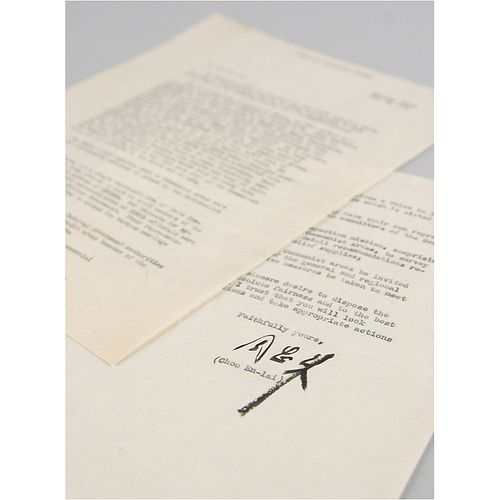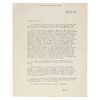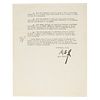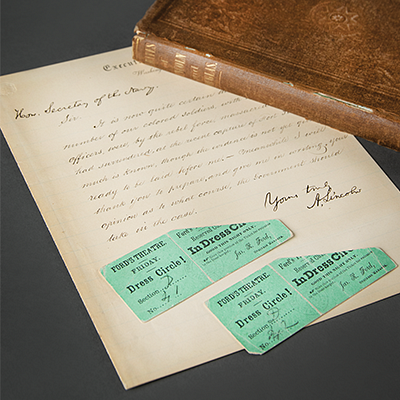Chou En-lai Rare Typed Letter Signed Asking for Recognition and Relief of Communist China
Two ways to bid:
- Leave a max absentee bid and the platform will bid on your behalf up to your maximum bid during the live auction.
- Bid live during the auction and your bids will be submitted real-time to the auctioneer.
Bid Increments
| Price | Bid Increment |
|---|---|
| $0 | $5 |
| $50 | $10 |
| $200 | $25 |
| $500 | $50 |
About Auction
Sep 23, 2023
RR Auction support@rrauction.com
- Lot Description
Chinese revolutionary and politician (1898-1976) who was the chief diplomatic representative of the Communist Party as the Premier of the People's Republic of China from 1949-76. Extremely rare TLS in English, signed in Chinese by Chou En-lai, two pages, 8 x 10, July 14, 1946. Letter to "Mr. Ray," J. Franklin Ray, Acting Director of the United Nations Relief and Rehabilitation Administration (UNRRA) China Office, asking for recognition and relief of Communist areas in China during the Chinese Civil War. In full: "In connection with Mr. Fiorello H. Guardia's telegram which was sent to Generalissimo, Dr. T. V. Soong and myself, I wish to put forward the following points for your consideration:
Out of 27 war-torn provinces in China, 19 fall either completely or partially under Communist jurisdiction. They suffered most heavily from Japanese ravages and should be relieved immediately, as have been testified by UNRRA and CNRRA inspectors. The total population in these Communist areas amounts to 140,000,000 of which 26,000,000—60% of the famine-stricken population in China—are badly in need of relief.
As I learned by mid-June 660,000 tons of UNRRA relief supplies have been delivered to China. But Dr. Gorge Hatem, American medical advisor of the Relief Committed of the Chinese Communist Areas, reported to me that up to the same date only 4,418 tons of those supplies had reached the Chinese Communist areas. In other words, only 0.67% of the total UNRRA relief supplies were allotted to their share. The CNRRA officials attributed this fact to transportation difficulties and war hindrances. However, such an argument is not based on sound foundation, seeing that there are such sea-ports like Chefoo and over 10 railroad lines and innumerable highways which lead directly into the Communist areas, not to say that some part of the Communist areas are not affected by the civil war at all.
The UNRRA relief supplies sent to Communist areas were also not infrequently detained or seized by the Nationalist troops. Furthermore, not a single representative of those Communist areas has been invited to work as staff members of the general or regional offices of CNNRRA. Our requests for appointing some Communist representatives as CNRRA officials were flatly rejected by the Chinese Government. Their representatives are not even permitted to attend the various meetings of the CNRRA and UNRRA.
Thus it is evident that the National Government authorities are discriminating against the Communist areas because of the political beliefs of the people in them. In view of the foregoing, we deem it essential:
a. that the Communist areas be given a voice in the 20th session of the Far-East Region Conference which is slated to meet on July 20 in Shanghai;
b. that the Communist areas may have their own representatives with voice in the allocation committees of the General and Regional Offices of the CNRRA;
c. that UNRRA initiate an inspection mission, comprising representatives of UNRRA, CNRRA and Communist areas, to survey the field, investigating and making detail recommendations regarding the distribution of UNRRA relief supplies;
d. that representatives of Communist areas be invited to serve as senior staff-members of the general and regional offices of CNRRA, and that effective measures be taken to meet their requests.
Being keenly aware of your sincere desire to dispose the relief supplies in China with absolute fairness and to the best interest of the Chinese people, I trust that you will look favorably toward my recommendations and take appropriate actions to meet the urgent situation." In fine condition.
The United Nations Relief and Rehabilitation Administration (UNRRA) was an international aid organization established in 1943 by 44 Allied nations to provide relief to areas under occupation by the Axis Powers. In January 1945, the Nationalist government of China established a parallel agency, the Chinese National Relief and Rehabilitation Administration (CNRRA), to distribute the UNRRA supplies. In spite of the UNRRA's resolution that the agency's resources be distributed fairly, 'on the basis of the relative needs of the population in the area, and without discrimination because of race, creed, or political belief,' that was not the case—as Chou En-lai here observes.
From the Hoover Institution Library and Archives: 'The provinces of the North, which had been under the longest occupation by the Japanese, were also the areas of Chinese Communist guerilla activity. After the Japanese surrender, these territories fell under Chinese Communist control. Difficulties arose in the distribution of aid due to the reality of civil war. The official history of the Administration estimates that 2-3% (by weight) or 4-5% (by value) of all UNRRA supplies were distributed to Communist-held territories.'
Following the failure in negotiations between the Chinese Communist Party and the Nationalists (Kuomintang), Chou En-lai turned his focus from diplomatic to military affairs, working directly under Mao as his chief aide. Using the techniques of guerrilla warfare, the Communists were ultimately able to overwhelm Chiang Kai-shek's Nationalist troops, seizing Beijing and Tianjin in 1949. With the establishment of the People's Republic of China on October 1, 1949, Chou was appointed as both Premier of the Government Administration Council and Minister of Foreign Affairs. He would play a leading role in developing China's foreign policy and economy in the second half of the 20th century. - Shipping Info
-
Bidder is liable for shipping and handling and providing accurate information as to shipping or delivery locations and arranging for such. RR Auction is unable to combine purchases from other auctions or affiliates into one package for shipping purposes. Lots won will be shipped in a commercially reasonable time after payment in good funds for the merchandise and the shipping fees are received or credit extended, except when third-party shipment occurs. Bidder agrees that service and handling charges related to shipping items which are not pre-paid may be charged to a credit card on file with RR Auction. Successful international Bidders shall provide written shipping instructions, including specified Customs declarations, to RR Auction for any lots to be delivered outside of the United States. NOTE: Declaration value shall be the item’(s) hammer price and RR Auction shall use the correct harmonized code for the lot. Domestic Bidders on lots designated for third-party shipment must designate the common carrier, accept risk of loss, and prepay shipping costs.
-
- Buyer's Premium



 EUR
EUR CAD
CAD AUD
AUD GBP
GBP MXN
MXN HKD
HKD CNY
CNY MYR
MYR SEK
SEK SGD
SGD CHF
CHF THB
THB













